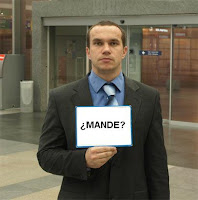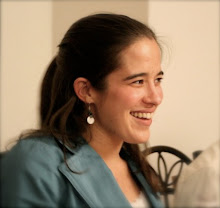I've had a lot of people asking how it's going with Spanish here. Overall, it's been fairly painless and almost effortless. I'm certainly gaining in filling the small pages of the little book I carry around with me to write down new Spanish words to look up or English words to look up how to say in Spanish. The medical abbreviations and physical exam, of course, are the most challenging new thing and the ones I use most often (some of them, at least). It reminds me how much of its own language medicine is, with the abbreviations I now take for granted. UTI (urinary tract infection), CVA (cerebrovascular accident - stroke), AMI (acute myocardial infarction), CBC (complete blood count), UA (urinalysis), PE (pulmonary embolism), po (per os - oral), q6h (every 6 hours), r/o (rule out), and many more all have their own parallels in Spanish.
Ecuador doesn't seem to have quite as much pachuca (Costa Rican word for slang) as Costa Rica from what I can tell. There have been a few interesting exceptions, including some medical stuff (but I won't get into the fact that I have to ask personal questions of patients on a regular basis and that they say some of them differently here). Perhaps the most common thing that was new to me is the use of mande to mean "What?" or "What did you say?"
God seems to be much more an accepted part of Latin worldview, and it shows up in the language. I commonly tell patients, Que Dios le bendiga (May God bless you) in Spanish, which I would almost never say in English, not because I don't wish it for those I encounter but simply because it's not as much an assumed part of the shared worldview. I have also had a number of patients refer to future plans with the conditional si Dios quiere (if God wants/wills). I'm not sure how much of that is a conscious self and public reminder of our own place in the controls of the world and our lives and how much is simply an unconscious saying, but it is a good reminder to me at any rate, whose lack of familiarity with the common use of the phrase forces me to encounter it and its message anew.
I thought Costa Ricans were known for diminutives, which is where they get their name Ticos (from adding -tico to the ends of words). But Ecuadorians certainly do it a lot. Nearly everyone's names that end in a vowel (and even if they don't) becomes "-ito" (e.g. Marita, Anita, Pablito, etc.). It is added to terms of affection, which are used much more liberally here, such as asking someone to climb onto the examining table with the affectionate term mi hijito/a (my little son/daughter). This is commonly used with patients regardless of whether the patient is one's senior in years or not, although it's certainly used more with children. It's not the paternalism it would imply in English, but it is taken for granted to be a more demonstrative relationship than many physician-patient relationships in the States.
Obviously not my picture. (For those of you who don't know, that's not me. :)) But just too cute not to use.
Thinking of terms one calls children, I love the variety of terms Spanish has for crooning at babies: mi cielo (my heaven), mi amor (my love), cariño (affection), mi vida (my life), mamita (literally, little mom, but it doesn't really translate like that), mi reina (my queen), and corazón (heart) among others. Many of those things I would never be comfortable saying in English to random babies, but I croon many of them regularly as I examine newborns or see infants in the consulta externa (outpatient clinic). I don't know for sure what parents think of it, but I think in general Latin culture probably doesn't mind the affection. :) At least, I sure hope so!
Ecuador doesn't seem to have quite as much pachuca (Costa Rican word for slang) as Costa Rica from what I can tell. There have been a few interesting exceptions, including some medical stuff (but I won't get into the fact that I have to ask personal questions of patients on a regular basis and that they say some of them differently here). Perhaps the most common thing that was new to me is the use of mande to mean "What?" or "What did you say?"
God seems to be much more an accepted part of Latin worldview, and it shows up in the language. I commonly tell patients, Que Dios le bendiga (May God bless you) in Spanish, which I would almost never say in English, not because I don't wish it for those I encounter but simply because it's not as much an assumed part of the shared worldview. I have also had a number of patients refer to future plans with the conditional si Dios quiere (if God wants/wills). I'm not sure how much of that is a conscious self and public reminder of our own place in the controls of the world and our lives and how much is simply an unconscious saying, but it is a good reminder to me at any rate, whose lack of familiarity with the common use of the phrase forces me to encounter it and its message anew.
I thought Costa Ricans were known for diminutives, which is where they get their name Ticos (from adding -tico to the ends of words). But Ecuadorians certainly do it a lot. Nearly everyone's names that end in a vowel (and even if they don't) becomes "-ito" (e.g. Marita, Anita, Pablito, etc.). It is added to terms of affection, which are used much more liberally here, such as asking someone to climb onto the examining table with the affectionate term mi hijito/a (my little son/daughter). This is commonly used with patients regardless of whether the patient is one's senior in years or not, although it's certainly used more with children. It's not the paternalism it would imply in English, but it is taken for granted to be a more demonstrative relationship than many physician-patient relationships in the States.
Obviously not my picture. (For those of you who don't know, that's not me. :)) But just too cute not to use.
Thinking of terms one calls children, I love the variety of terms Spanish has for crooning at babies: mi cielo (my heaven), mi amor (my love), cariño (affection), mi vida (my life), mamita (literally, little mom, but it doesn't really translate like that), mi reina (my queen), and corazón (heart) among others. Many of those things I would never be comfortable saying in English to random babies, but I croon many of them regularly as I examine newborns or see infants in the consulta externa (outpatient clinic). I don't know for sure what parents think of it, but I think in general Latin culture probably doesn't mind the affection. :) At least, I sure hope so!



i always liked all those terms of endearment too. Tia Jeannette used to use them regularly. :)
ReplyDelete- Bekah